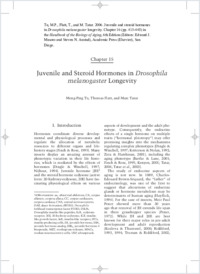Juvenile and Steroid Hormones in Drosophila melanogaster Longevity
- Flatt, Thomas University of Fribourg
- Tu, Meng-Ping
- Tatar, Marc
-
2006
Published in:
- The Handbook of the Biology of Aging / Masoro, Edward J. ; Austad, Steven N.. - Academic Press. - 2006, p. 415-448
English
This chapter reviews hormonal effects on aging in Drosophila melanogaster. The insect juvenile hormone (JH) is a sesquiterpenoid compound produced by the corpora allata (CA), a pair of endocrine glands with nervous connections to the brain. In pre- adult development and metamorphosis, JH functions as a "status quo" hormone, allowing continued growth after ecdysteroid-induced molting. Metamorphosis can only take place when the ecdysteroids act in the absence of JH. During the final larval instar, the JH titer declines because of a cessation of synthesis and increased degradation in the hemolymph and target tissues. Steroid hormones, such as ecdysteroids, are another class of vital hormones in insects. In pre-adult flies, 20E is produced in the larval prothoracic gland, which makes part of the larval ring gland in dipterans. Both JH and 20E play major antagonistic or synergistic roles in regulating Drosophila development. Application of commonly used JH inhibitors, such as precocene or fluvastatin, can reduce or inhibit JH synthesis in the CA and may thus be used to study the effects of JH deficiency on life span.
- Faculty
- Faculté des sciences et de médecine
- Department
- Département de Biologie
- Language
-
- English
- Classification
- Biological sciences
- License
-
License undefined
- Identifiers
-
- RERO DOC 324317
- DOI 10.1016/B978-012088387-5/50018-2
- Persistent URL
- https://folia.unifr.ch/unifr/documents/307657
Statistics
Document views: 146
File downloads:
- Texte intégral: 292
